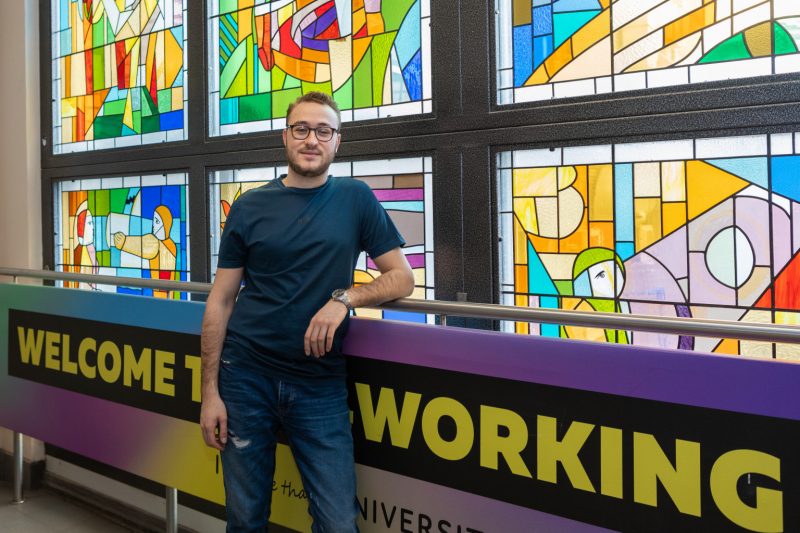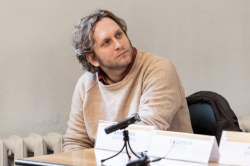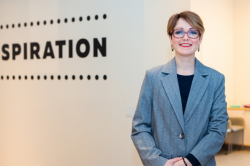Why did you choose to study information technologies and programming?
I’m from Kandalaksha, a small town in Murmansk Oblast, Russia. There, locals usually know who teaches well, and if you’re lucky to be in their class, you’re surely going to get into a good university in the future. They can tell you which university to choose if you want to apply for this or that specialization. Say, you’re interested in physics and mathematics, then your best choices are Peter the Great St. Petersburg Polytechnic University (SPbPU), St. Petersburg State University, ITMO University, St. Petersburg Electrotechnical University “LETI”, or Moscow Institute of Physics and Technology. This way, while still in school, students already know everything they need to know about their future alma maters, like faculties and entry points, and begin preparing for their exams.
I studied information technologies intensively in school. I didn’t even dream of studying at ITMO and thought that I would end up going to St. Petersburg State University. Yet somehow I got enough points to get in, even though I had almost none programming skills at that moment. Among many other things, I chose ITMO because of the location: its main campus is right downtown. Perhaps, if I'd picked another school, things would have been different right now. However, I don’t regret my decision. I enjoyed studying at ITMO.
What did you do after graduation? How did you find a start in your career?
Almost all ITMO’s IT students get started with their careers while still doing their Bachelor’s and those with outstanding talents can even kick off already in their first or second year here. Many students work and study at the same time. This is a common practice. So you might feel pressured when you see your fellow students trying to apply for their first jobs when you haven’t even started yet. This prompted me to get a job when I was still at university, though I could take a bit more time to focus on my studies. By the end of my third year, I got into the Dell EMC company where I have worked for about four years doing various projects. There, I advanced from an intern to a senior engineer. About two and a half years ago, I accepted the offer for the same position at Infobip.
Apart from your corporate jobs, you also teach students at university. How did you become interested in this field?
I think it all started when I became a student myself. I always compared school and university teachers and, sadly, the latter didn’t always win in this comparison. Though I was lucky to meet some great talents, I often wondered about what can be done to make learning more efficient and engaging for students. I thought I knew what some lecturers were lacking and how to make the situation better. Besides, I studied at the Computer Science Center – this is an educational project created by JetBrains, the School of Data Analysis, and the Computer Science Club. There, I met passionate teachers who did their best and were completely involved in the process. They were just like me but with greater experience. I picked up their best techniques and tried to figure out how I could put them in practice.
After I earned my Master’s, I assured Alexander Mayatin, an associate professor at the Information Technologies and Programming Faculty, that he could count on me and in a while he called me to offer me a teaching position. I was surprised but decided not to miss this chance. And here I am – I’ve been working at ITMO since 2019.
When I started teaching, we created a special website for our students called Quipy where together we can discuss educational projects, as well as set objectives and ensure their completion. Apart from that, it’s also great for personal to-do lists.
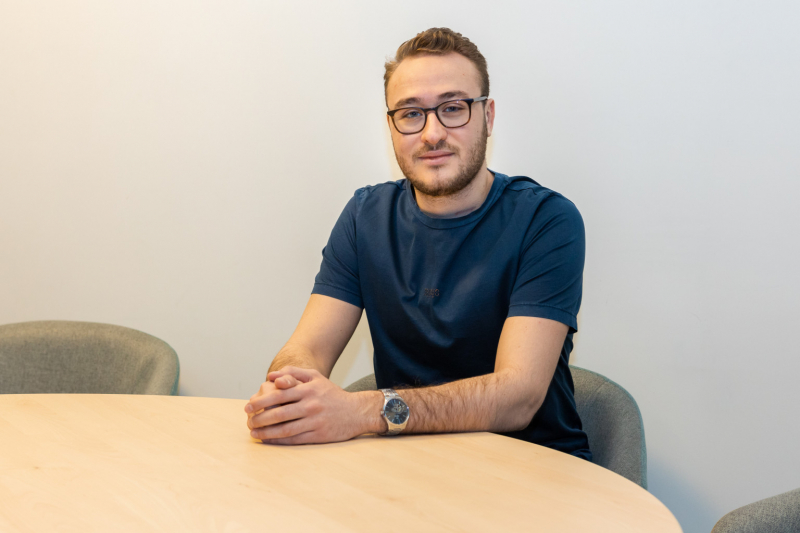
Andrey Sukhovitsky. Photo by Dmitry Grigoryev / ITMO.NEWS
What is the most important thing about being a teacher?
Teaching helps me become better at my job. It’s important for me to receive feedback from my students. To be sure that what I am doing doesn’t go to waste, I regularly ask my students about what they think about my work. I also get messaged by my students who want to thank me for helping them land a job. I’m always glad to hear that but I understand that I can’t go without negative reviews either. They help me get a do-over in terms of my teaching goals and style.
When I was a student myself, I didn’t always understand the material and when this happened, I always asked questions. Because of this, I find it crucial for students to have a person around whom they can talk to and turn to when experiencing any learning difficulties – a sort of a mentor or an older colleague. And that’s who I’m striving to be.
You received an award at the ITMO.EduLeaders contest for your project on simulating real industrial processes of software development as part of a course on design and development of microservice systems. Could you tell us more about it?
I’ve taught software design for five semesters and all this time I tried to change things up. In doing so, I ended up moving from a rather conservative approach to a more practice-oriented one. The thing is, lecturers teach students to code, design, and write documentation but once they start working, they learn that development can be done differently: colleagues always communicate with each other, organizational structures vary from company to company, and even roles and responsibility may be unclear.
So I thought it'd be great to recreate the structure of the enterprise where I work at our university. The course was conducted for 160 students of the fourth year at the Information Technologies and Programming Faculty. We divided them into small teams of four to six people with different majors so that they could do what they liked most. As a result, we had several groups, which were engaged in various tasks: Android and iOS development, business analytics, web development, and so on. All students could communicate with each other and this way expand their horizons and learn more about other fields, too. They were expected to work real-time, meaning that they couldn’t but complete their tasks on time. This was a true team game! If you didn’t make it, you would let down your teammates and ruin both your individual and team results.
Since our students rush to get their first jobs, we had many fourth-year students who have already found their niche but we also wanted to see those who haven’t started out yet to let them experience work life. We received various reviews: practicing students already employed at companies weren’t much impressed but those who had no experience or worked at a small company were surprisingly thrilled. Every week, I asked the participants for feedback and got a lot of positive reviews. Students enjoyed networking, taking part in global activities, making decisions, and seeing the fruits of their work. Some even said that the course helped them land a job.
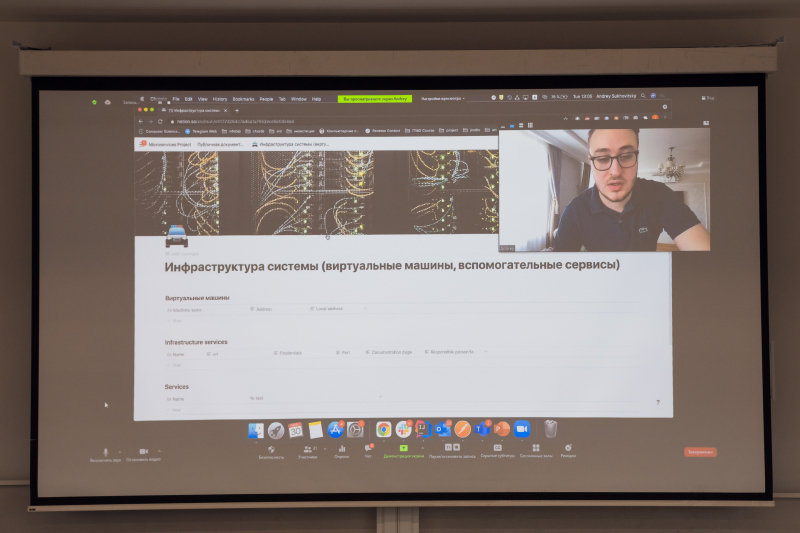
Andrey Sukhovitsky’s presentation at ITMO.EduLeaders. Photo by ITMO University
Not only students but also other lecturers spoke highly of your course. What do you think they like most about your project?
The industry needs IT specialists who not only code but can also easily integrate into production processes. They should immediately pay off and not spend a year trying to figure out how things work. That was the goal of our project, namely, to help students adapt and start tackling business tasks faster, as well as show that software development is not just about hard skills but also soft skills and communication. What’s more, communication skills are often way more important than coding. Although specialists are usually asked either to code or communicate with customers and their colleagues, we wanted to build an environment where students could practice both skills. I believe what my colleagues appreciated most was our symbiosis of soft and hard skills and an integrated approach to teaching future IT specialists. I know that our course helped many people pass interviews and improve their work performance.
You didn’t run your experiment this year, why so?
This experiment was a real eye-opener. I do value students’ feedback and I figured that this format was a bit too complex for them. Plus, it was a bit more intense and time-consuming than my colleagues and I thought. I guess it isn’t that simple to work in real-time with no retests, just like in real production, and be responsible for the results of a huge team after all. Not to mention that each person has their own motivation to learn.
Hence, we had to change the format this year. As before, our students work in teams in real-time but the tasks are a bit different. They do team projects with real-world industrial tasks. Most of the cases are based on what my colleagues and I have experienced throughout our careers. However, unlike last year, the course welcomes teams of five people, not all fourth-year students at the faculty.
In the future, we’d like to add infrastructure tasks. For instance, we might ask our students to work with distributed third-party systems so that they would learn to consider external circumstances, as well. Although specialists have no control over them, they should be able to cope with them.
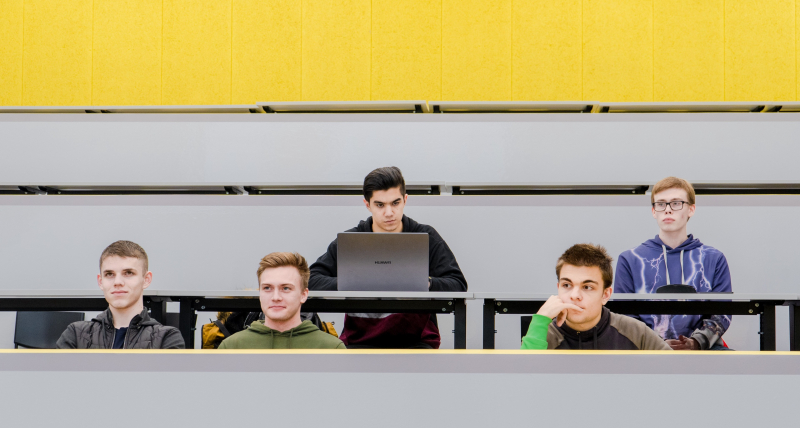
Students at ITMO’s Information Technologies and Programming Faculty. Credit: vk.com/itmo_fitip
As an IT specialist, what do you think about all the short-term programming courses claiming that IT specialists don’t need higher education?
I’m still trying to figure it out myself. I met many IT specialists with different backgrounds, be it mathematics, physics, or electrical engineering. Some professionals can’t do without a degree, especially if they have to work with complex software products, as well as model or design medical or aviation technologies. However, the market today is often looking for people who have programming skills and knowledge of certain frameworks, which are just enough to solve specific business problems. It also happens that people have no desire to climb up their career ladder or don’t have great technological ambitions. So, I think that not everyone needs higher education. Yet those who want to get it must have the skills to do more than just certain tasks. They should master their communication skills, understand business processes, and be great managers.
What do you like to do in your spare time?
I enjoy going to parks or simply walking around the city. I like meeting my friends for a chat over a glass of wine. I also read and watch movies a lot. I analyze them and then make lists of my favorite movies, directors, and actors.
